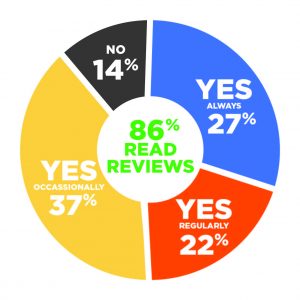Word of mouth has long been considered the most trustworthy and effective way for businesses to grow their customer base. Traditionally word of mouth has taken the form of recommendations from friends and family, which consumers trust more than any type of marketing and advertising. In the digital world, where our definition of “friends” has broadened and opportunities for people to express their opinions have skyrocketed, the online review has essentially become the new word of mouth.
Today’s consumers rely heavily on online reviews on their path to purchase – perhaps more than you might think. The recent Local Consumer Review Survey by BrightLocal sheds light on how much consumers read and rely on online reviews.1 The survey found that 92% of consumers looked online for local businesses in 2018. More than two thirds (69%) did so at least once a month and 27% searched for a local business online every day.
An overwhelming majority of consumers are not just searching for businesses online but are also looking for recommendations based on online reviews. According to the survey, 86% of consumers read reviews for local businesses to decide if a business is good or bad, up from 71% in 2011.
Do you read online reviews for businesses?

Echoing the strength of traditional word of mouth, a substantial 78% of U.S. consumers trust online reviews as much as personal recommendations. Furthermore, 68% of consumers more likely to use a business based on positive reviews, and 50% will visit a local business’s website after reading positive reviews. With the reach of online platforms far exceeding traditional word of mouth, it is clear to see how online reviews can be crucial to your business’ success. As customers continue to become more powerful and engaged with local businesses, understanding, monitoring and managing your overall online reputation is vital.
“It takes 20 years to build a reputation and five minutes to ruin it. If you think about that, you’ll do things differently.” Warren Buffet
For a small business, finding time to monitor and manage your online reputation can seem like a daunting task. Or you may think that if you don’t actively establish an online presence that you won’t need to worry about monitoring one. But that would be a mistake. It’s important to realize that even if your business isn’t online, your reputation may be. In addition to social media, there is a myriad of business listing and review sites where people can engage with or talk about your business. Knowing how visible your business is online and what people are saying about it is an essential part of doing business in today’s digital world. Following are some tips that can help get you started on the path to managing your online reputation and building a strategy to ensure you are protecting your brand image.
Claim
Beyond Google, Yelp and Facebook, there are countless other sites that feature business listings and reviews. These include BBB, Trip Advisor, Yellow Pages, Superpages, Manta, Angie’s List, CitySearch and Foursquare just to name a few. With all the directories out there, it is possible that inaccurate information is being listed about your business, or that you are getting reviews you don’t even know about. Therefore, it is imperative that you claim your business listing on as many sites as possible. By claiming your listings, you will have more control over your information and add credibility to your business.
Staten Island Media Group’s search experts recommend starting with Google My Business. The free service enables you to take charge of what people see when they search for your business on Google. It can also be set up to let you know when customers post photos or leave reviews.
Monitor
Once you have a good feel for where customers are finding information about your business, it is essential to invest time in monitoring your online reviews. You should set aside regularly scheduled time to check for and respond to reviews, weekly if possible. Like Google My Business, many other review sites will send notifications when someone posts a review about your business, but only if you have claimed your profile.
And don’t forget about your social media pages. Social networking sites have become an increasingly popular way for satisfied, or unsatisfied, customers to quickly tell all their friends precisely what they think about your business. According to Joel Espinoza, Director of Social Media, if you don’t have someone to monitor and respond to reviews on Facebook you should consider turning off recommendations, so people cannot post on your page. This might be advisable to avoid seeming unresponsive, or as a temporary measure if you are getting a lot of negative reviews and are working to improve your products or services. However, engaging in honest dialog with your customers by responding to reviews adds value, which we will cover next.
Respond
Simply monitoring reviews is not enough to effectively manage your online reputation. Responding to reviews, both good and bad, will go a long way toward earning the trust of your customers and illustrating your dedication to them and to your business. A good rule of thumb is to ALWAYS respond to ALL reviews ASAP.
Responding to good reviews let’s your current (and future) customers know you appreciate them and builds loyalty. Responding in a timely manner, especially to a negative review, not only shows the customer that you are listening and care about their opinion, but also provides an opportunity to rectify the situation and save the relationship. In fact, according to Yelp responding to a review within 24 hours boosts the likelihood that the reviewer will upgrade their review to a higher star rating by 33%.2
“Treat bad reviews as an opportunity.” says Joel Espinoza, Director of Social Media. “They give you a chance to listen, explain, rectify the issue and win back the business.”
Espinoza adds that having some bad reviews is to be expected in any business. You simply can’t please everyone all the time, and having some bad reviews adds credibility and balance to the good ones. Following are some pointers for handling negative reviews:
- Acknowledge – Recognize the reviewer’s concerns and thank them for their business and feedback.
- Apologize – Remember that regardless of who is right or wrong, it is the customer’s disappointment and perception of being wronged that must be addressed.
- Keep It Real – Make your response personal, not canned or overly corporate. Try to find the right balance between friendly and professional. Give them a name, ideally the owner, to let them know who is accountable.
- Keep Your Cool – Don’t let your emotions affect your response. As difficult as it is to read negative comments about your business, you must remain professional and not respond in hast or anger. Trying to see the issue from the customers’ point of view will help put things in perspective.
- Take It Offline – After acknowledging the customer’s concerns through public comments, re-direct the conversation to private channels. Encourage the customer to direct message you or provide your contact information and ask them to allow you the opportunity to resolve the issue. Experts suggest you should never respond more than twice to the same customer about the same issue on a public channel.
- Fix It – Once you have apologized and identified the source of the problem, do everything you can to actually fix it. Actions speak louder than words. Strive to build trust and customer confidence that you will hear their concerns and rectify any issues. If you can’t go back and fix the problem, perhaps offer a discount for future service and ask them to give you another chance. In the long run, it is usually easier to try to keep an existing customer than to acquire a new one.
- Request a Revision – If you are confident that you have remedied the customer’s concerns, there is nothing wrong with asking them to revise or remove their negative review.
Request
When you consider the importance of online reviews it becomes clear that your existing customers can sometimes be your company’s best marketers. Businesses need to be proactive in generating reviews and encouraging their customers to be advocates for them. In fact, 70% of consumers who were asked to leave a review by a local business did so.1 You likely have plenty of happy customers who would be willing to recommend your business – you just need to ask.
Don’t be afraid to ask for reviews, always and often. Ask for reviews on all marketing collateral and customer touchpoints. On your website, have a place to accept reviews or provide a link to your preferred review sites, if asking is not a violation of that review site’s policy. Review requests can also be included on store signs, business cards, receipts, invoices and more. Using email to ask for a review is a common practice of online retailers.
Some studies show that the number of reviews a business has can boost local SEO rankings. In addition, adding more positive reviews can help “push down” the negative ones. Since the average consumer reads 10 reviews before trusting a business, it won’t take that many new positive reviews to depress a negative one.1
There are a few caveats to remember when trying to boost your number of online reviews.
Don’t ask for positive reviews. While you should get in the practice of asking for reviews you shouldn’t necessarily ask for “positive” reviews. Just like fake reviews, asking for positive reviews (or sometimes any reviews) is against the policies of review sites and can also come across as tactless to the customer.
Don’t incentivize. While it may seem harmless to offer a discount or other promotion in exchange for someone writing a review, it could be misconstrued as bribery or payment. This would be considered a conflict of interest and could lead to problems with the reviews sites and potential legal consequences.
Don’t write fake reviews. Besides being unethical, and potentially illegal, the practice can backfire and result in your business being penalized or banned from review sites. In addition, it can lead to mistrust among your current and potential customers.
Your online reputation is an integral part of your brand identity. It is something that everyone in your organization should be aware of and responsible for. Monitoring and managing your online reputation provides valuable feedback about your business and insight into what actions you can take to better serve your customers. The digital marketing experts at Staten Island Media Group can provide guidance to help you better understand your online reputation, and methods to expand or improve it.
Written by Stephanie Klein, Research Analyst
Sources:
- https://www.brightlocal.com/learn/local-consumer-review-survey/#local-business-review-habits
- https://www.yelpblog.com/2017/03/responding-reviews-within-24-hours-boosts-upgrade-probability


